- Home
- Kevin Ashman
The Tomb Builders
The Tomb Builders Read online
The Tomb Builders
An India Sommers Mystery
by
K. M. Ashman
Published by
Silverback Books
More Books by K. M. Ashman
The India Sommers Mysteries
The Dead Virgins
The Treasures of Suleiman
The Mummies of the Reich
The Tomb Builders
The Roman Chronicles
Roman I – The Fall of Britannia
Roman II – The Rise of Caratacus
Roman III – The Wrath of Boudicca
Roman IV – Boudicca’s Daughters – Coming Soon
The Medieval Sagas
Medieval I – Blood of the Cross
Medieval II – In Shadows of Kings
Medieval III – Sword of Liberty
Medieval IV – Ring of Steel – Coming Soon
Novels
Savage Eden
The Last Citadel
Vampire
Follow Kevin’s blog at:
WWW.Silverbackbooks.co.uk
or contact him direct at:
[email protected]
The Tomb Builders
Copyright K M Ashman 2014
All rights are reserved. No part of this publication may be reproduced, stored, or transmitted in any form or by any means, without prior written permission of the copyright owner.
----
All characters depicted within this publication other than the obvious historical figures are fictitious and any resemblance to any real persons, living or dead is entirely coincidental.
Table of Contents
Foreword
Prologue
Chapter 1
Chapter 2
Chapter 3
Chapter 4
Chapter 5
Chapter 6
Chapter 7
Chapter 8
Chapter 9
Chapter 10
Chapter 11
Chapter 12
Chapter 13
Chapter 14
Chapter 15
Chapter 16
Chapter 17
Chapter 18
Chapter 19
Chapter 20
Chapter 21
Chapter 22
Chapter 23
Chapter 24
Chapter 25
Chapter 26
Chapter 27
Chapter 28
Chapter 29
Chapter 30
Chapter 31
Author’s Notes
Foreword
The Tomb Builders is the fourth book in the India Sommers Mysteries and like the previous three, draws on facts and theories from the world around us to build an exciting yet informative story. Like all the others it can be read as a standalone novel but the reader would probably benefit from reading the first three books to get to know the main characters and backstory. The story will take you somewhere you may not have guessed but be patient for all is eventually explained.
So, put your feet up, grab a coffee, forget your troubles for a while and enjoy the adventure.
Kevin
Prologue
The Giza Plateau
Egypt -2600 BC
Sagira scrambled through the huge pile of rubble discarded by the masons. Her dark skin was white from the granite dust and her mouth bone dry from the heat, but the sensation was familiar for she had grown up amongst the debris.
Sagira was ten years old and the daughter of Mehmet the mason. While he and his fellow workers trimmed the granite blocks brought from the quarries, she would usually be helping her mother hand out water to the enormous workforce engaged on the project, an endless chore and one she found incredibly boring but it was her lot and it was important they all paid their way.
Once a year, just before the inundation of the Nile, Sagira and her family, along with many others from their home village, would travel the hundred miles or so to work on the king’s tomb and fulfil their obligation as citizens of Egypt.
For three months they would labour alongside thousands of others and for their efforts were awarded the princely sum of twenty loaves and two measures of beer a day. The payment was a nominal amount and each family could draw down the full payment or receive a note in the records of the administrators equal to the amount of credit accrued. This credit could then be bartered for other essentials such as meat or eggs to meet the family’s dietary needs. Having such a demanding job meant Sagira’s father needed a protein rich diet and her mother worked hard to ensure as much meat as possible went into the family pot.
At the end of the day, Sagira would take her place in the line of women claiming their payment and collect the bell shaped loaves on behalf of her family. Once safely in her basket, she would run down to the dock and haggle with the fishermen for whatever catch lay drying in the sun. Often she was too late and returned with nothing but the bread and a jug of ale and on such days they relied on what was left from previous pots, but usually her mother provided well and there were more replete days than hungry.
Today, however, there were no such chores to run. No heavy goatskins full of Nile water to carry to the workers and no standing in endless bread lines. Today was a holiday, a rare occurrence granted by the king himself in honour of his birthday. Usually work wouldn’t stop but the building was nearing completion and he was visiting the site to witness the progress achieved.
‘Come on,’ hissed Sagira to the boy behind her. ‘If we do not hurry, we will miss the procession. I can hear the horns heralding his approach.’
‘I still don’t think this is a good idea,’ said the boy miserably, ‘if the guards catch us we will be beaten and disgraced before our fathers.’
Adio was the son of Adeben, a mere brick maker who worked endlessly from dawn till dust, mixing wet clay with straw to make bricks to line the passages within the tomb. The task was physically demanding and Adeben’s wage was based on the amount of bricks accepted by the overseer. Every hundred earned the equivalent of one loaf, and a measure of beer was only added when the thousandth brick was handed over. Adeben was old and his return diminished weekly. His fingers often locked through cramps and no matter how hard he worked, his family often went without meat for days on end.
‘Oh stop being a child, Adio,’ said Sagira, ‘I have been coming here for as long as I can remember, yet never have I seen the king.’
‘He is not for our eyes,’ mumbled Adio as he scrambled amongst the piles of rocks, ‘Maftet the god of justice will surely take our eyes should we gaze upon Khufu.’
‘Nonsense,’ said Sagira, ‘if we keep low he will never see us.’
‘The gods see everything,’ said Adio but kept climbing. Within moments they reached the top of the haphazard pile of discarded stones and gazed at the construction site.
Though she saw the tomb every day, it never failed to take Sagira’s breath away. Rising before them, higher than the highest cliffs in her home land, soared the shining white sides of the greatest building the world had ever seen, the pyramid of the living god, King Khnum Khufu. Though the very top remained unfinished, the scaffolding and ramps had been removed from most of the sloping walls and the tura stone casings dazzled as they reflected the midday sun. The casings were pure white and had been highly polished before being put in place and though there was still several months’ work left upon the pyramid, it already struck awe into whomever lay eyes upon it.
‘There they are,’ hissed Sagira, looking toward the Nile.
‘There’s a lot of them,’ said Adio.
Sagira agreed. In the distance she could see the royal barges travelling serenely toward the site, each decorated with the colours of the king and each manned with priests from the city tem
ples. There were many boats in the procession but the greatest of them all had a sail emblazoned with the image of Osiris, a suitable tribute when visiting the future tomb of a king. Fifty oars pierced the walls of the royal barge and the vessel sailed smoothly up the manmade canal before stopping alongside one of the newly erected wooden quays.
In the centre of the barge, the king sat motionless under an awning of silken cloth as six female slaves kept him cool with fans of ostrich feathers. Upon his head he wore the Nemes headdress, the blue and gold striped crown reserved for religious duties and around his waist he wore a kilt of fine linen, encrusted with tiny jewels from across the country. His torso was naked though he wore golden bracelets around his upper arms and a chain of heavy gold lay around his neck.
He waited as the priests disembarked and lined the walkway toward the wooden dais, constructed especially for the occasion. When they were ready, the heralds blew their horns and as Khufu descended the carpeted gang plank, the priests released baskets of birds to fly in his honour. A line of young girls walked before him, scattering petals while others sprinkled sweet smelling oils in case his nose be offended by the smell of the many guests lining the sides of the road.
Slowly he walked along the carpeted route and as he passed, every person prostrated themselves in the dust, as was only right in the presence of a living god. Finally he climbed the steps and stood upon the platform, gaining a clear and unobstructed view of his final resting place. For an age he gazed upon the astonishing brightness of the casings and eventually turned to the priest standing beside him.
‘Is the overseer here?’ he asked.
‘He is, Majesty,’ said the priest.
‘Then summon him to my side, I would speak to him.’
The priest bowed and walked backward before turning to find the overseer of the works. Within moments, Khufu became aware of a man prostrating himself at his feet.
‘Stand, Hemon’ he said, ‘and address your king.’
The man stood yet kept his gaze downward.
‘Greetings, Majesty,’ he said, ‘may the blessings of Osiris be on you and your house this day.’
‘And yours, Hemon,’ answered the king, ‘stand beside me and gaze upon what I see.’
The head overseer stood alongside Khufu, his heart racing at the extraordinary privilege granted him. Together they stared at the pyramid and Hemon held his breath, waiting for the judgement that could decide his fate.
‘Your king is pleased,’ said Khufu eventually, much to Hemon’s relief, ‘when will the capping stone be put into place?’
‘Majesty, your goldsmiths are inlaying the gold as we speak and have been doing so for many weeks. It has taken two hand carts of ingots to inlay the designs and when it is in place, it will signal to the world that truly this is the resting place of the greatest king ever to bless us with his presence.’
‘Your work makes me smile, Hemon,’ said Khufu, ‘and what of the chambers?’
‘Exactly as your architects designed, Majesty. The king’s chamber is at the heart of the pyramid and already well blessed with treasures from across your kingdom.’
‘And there are suitable systems in place to foil those foolish enough to try to rob the tomb of a god?’
‘There are,’ said Hemon, ‘dead falls and hidden pits carpeted with poison barbs await the foolish. There are also huge granite slabs that will be lowered into place after your body is interred. Once they have dropped they cannot be lifted again and your tomb will be sealed forever. When the ceremonies are over, all entrances will be backfilled and covered with the final casings before being sanded to a smooth finish leaving no trace of the entrances. Finally an army will guard your resting place for a thousand years and anyone coming within arrowshot of the pyramid will be executed immediately without appeal.
‘And what of the queen’s chamber?’
‘Majesty, I am ashamed to say I do not have much information about the progress of the lesser chamber for your priests forbid entry to that part of the tomb.’
‘Good,’ said Khufu, ‘that is how it should be for there are things in place that are for the eyes of your king and his priests only.’
‘I understand, Sire,’ said Hemon.
‘I have heard enough,’ said Khufu eventually, ‘and am impressed with your work. Go to my treasurer and have him allocate you a thousand head of cattle and the most fertile lands at the turning of the Nile. You have worked hard for most of your life and I will reward those who please me.’
‘Majesty, I am well paid with gold, women and wine but I would do it all again for nought just in honour of your name.’
‘Your loyalty is noted, Hemon and though you are a humble man, your descendants will enjoy the fruits of your labours. From this day forward you will be assigned the title of king’s favoured man and will be welcomed at my palace as an advisor.’
Hemon gasped at the extraordinary gesture but before he could say anything, Khufu spoke again.
‘Now, be gone,’ he said, ‘for I would talk to my priests.’
Hemon bowed low and walked backwards from his presence.
‘Have Haji attend me,’ said Khufu to one of his attendants.
The servant ran across to the line of priests and relayed the message. Soon a taller than average man walked through the crowd using a spear as a staff. His head was shaved bald as was the manner of such people but his countenance was proud, unlike the cowering faces the king saw on a daily basis. This was Haji, priest of the temple of Amun and one of Khufu’s closest advisors. He had once been a warrior in the armies of Khufu’s father, Sneferu but had been grievously wounded and had lay dying in the eastern desert before claiming Amun himself had appeared in the night and healed his wounds. Since then he had cast aside the way of the warrior and become an acolyte of the most powerful god of them all, Amun Ra. Despite his spiritual calling, Haji maintained the spear that once accompanied him into battle as a reminder of the man he had once been and was in charge of the works to finish the queen’s chamber, the secondary tomb intended for the wife of Khufu.
‘Majesty,’ said Haji, bowing low from the waist, ‘your presence makes the sun shine brighter.’
‘Haji,’ said Khufu, allowing the imposing man to stand, ‘you have neglected me with your absence. Have I offended you?’
‘Of course not exulted one,’ answered the priest, ‘how could a mere underling such as I ever be offended by the whim of a god. Indeed, you could remove my head right now and I would proclaim my thankfulness it was you who sent me to the two fields. The truth is the works have been far more demanding than expected and though we have engaged the best from across the country, my eye is needed for the detail we agreed.’
‘And how go the arrangements?’ asked Khufu.
‘Everything is as you desired. Those working on the queen’s chamber are kept isolated from the rest and each team has been tasked with only a small part of the works. We are the only two people alive who know the true extent of your vision.’
‘Does it near completion?’
‘It does, Majesty and everything is as you said it would be all those years ago. Your infinite knowledge sees beyond all horizons.’
‘Your king is pleased,’ said Khufu, ‘but there is something you should know. Come to my chambers at dusk but come alone, there are things that must be said which are for your ears only.’
‘Your will be granted, Majesty,’ said Haji and retired to the ranks of the priests.
Khufu watched over the sacrifice of a white bull and sat back as his servants bathed his feet in the still warm blood, a symbolic action representing all life was below his feet. When they were done, the entourage turned and made their way back to the dock though this time, every living person lining the path, irrespective of station, remained prostrate on the ground until their king boarded his barge.
----
‘Did you see that?’ whispered Adio on top of the rubble pile, ‘that bull’s blood squirted everywhere.’
&nbs
p; ‘Did you see the women?’ asked Sagira, ‘their robes were of a silk so fine you could see right through them.’
‘Do you think the gods will blind us?’ asked Adio, touching his closed eyelids nervously.
‘They would have done so by now,’ said Sagira, ‘come, let’s get back before we are found.’
The two children descended the rubble but as they jumped from the last block, Sagira heard a loud crack and Adio screamed in pain as his ankle bent beneath him.
‘Adio, what’s wrong?’ gasped Sagira but the boy was in too much pain to answer. Sagira looked around in panic, knowing they were in a forbidden area and Adio’s cry could bring the guards running.
‘Adio,’ she said, ‘are you okay?’
‘I think my leg is broken,’ he sobbed as he sat in the dust.
Sagira looked at the boy’s foot and realised he was right, it lay at an impossible angle and she knew he must be in terrible pain.
‘I’ll get help?’ she said.
‘No,’ gasped Adio, ‘we will be punished, wait until after dark.’
‘Adio, I have seen men die from lesser wounds. It is important the bones are set before the poisons gather and infect your blood. We have to get you to a physician.’
‘No,’ gasped Adio, ‘I will not shame my father.’ He tried to move but cried out in pain before passing out in the dust.
‘Adio,’ said Sagira shaking his shoulders, ‘are you okay? Adio, wake up,’ but it was no use, the boy was out cold. For a few seconds she contemplated her options but finally knew what she had to do. If Adio wasn’t helped soon, he could die. She made up her mind and called out.
‘Help,’ she shouted at the top of her voice, ‘somebody help us.’
----
Chapter One
The Village of Nazra-El-Bedhel
Egypt – 2014
India Sommers sat on the wooden bench, staring at the graffiti covered wall before her. She had been in the Egyptian cell for two days and had been refused access to a British Embassy official. Overall the local police had treated her well but she knew it was only a matter of time before she was handed over to the authorities in Cairo and charged with illegal archaeology. It would have been done earlier but the fact she had lost her passport only added to the confusion and Egyptian bureaucracy was slow at the best of times. A rattle of keys came from outside the cell and she stood up to face the door as one of her jailers came in carrying a tray.

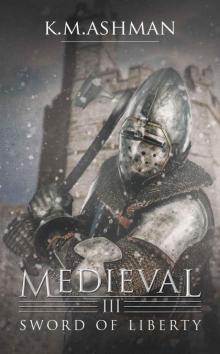 Medieval III - Sword of Liberty
Medieval III - Sword of Liberty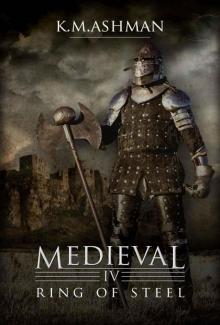 Medieval IV - Ring of Steel
Medieval IV - Ring of Steel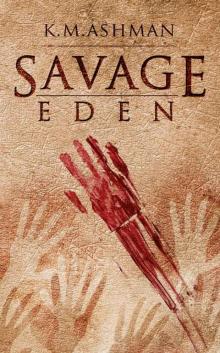 Savage Eden
Savage Eden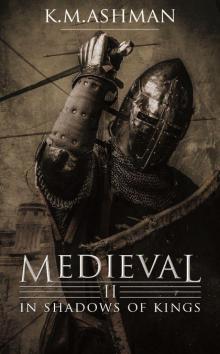 Medieval II - In Shadows of Kings
Medieval II - In Shadows of Kings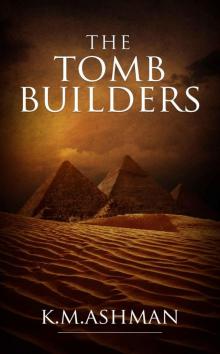 The Tomb Builders
The Tomb Builders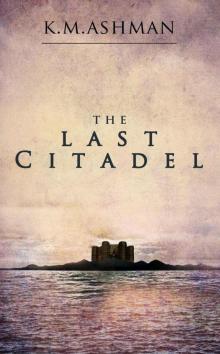 The Last Citadel
The Last Citadel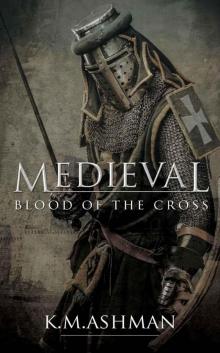 Medieval - Blood of the Cross
Medieval - Blood of the Cross Vampire
Vampire Roman
Roman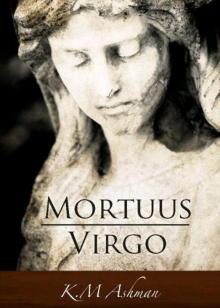 Mortuus Virgo
Mortuus Virgo